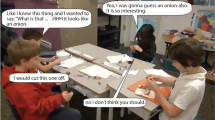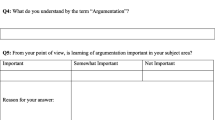Abstract
In this article, we elaborate methodologies to study the argumentation speech of a teacher involved in argumentative activities. The standard tool of analysis of teachers’ argumentation concerning pedagogical matters is Toulmin’s model. The theory of argumentation schemes offers an alternative perspective on the analysis of arguments. We propose an integrated way of analysis employing Toulmin’s model and argumentation scheme, based on Walton’s taxonomy. We examine the change of pedagogical argumentation of a teacher that participated in a graduate course that was based on the analysis of hypothetical classroom scenarios on the teaching of calculus in high school. By exhibiting our methodological analysis in a particular case, we show that by adopting two different analytical perspectives, we gain a deeper understanding of the structure and quality of teachers’ argumentation on pedagogical matters. The integration of the two qualitative methodologies could help identify several aspects of possible construction of knowledge in argumentative activities.
Similar content being viewed by others
References
Aberdein, A. (2007). Fallacies in mathematics. Proceedings of the British Society for Research into Learning Mathematics, 27, 1–6.
Ainley, J., & Pratt, D. (2002). Purpose and utility in pedagogic task design. In A. Cockburn & E. Nardi (Eds.), Proceedings of the 26th annual conference of the International Group for the Psychology of Mathematics Education (Vol. 2, pp. 17–24). Norwich: PME.
Aliseda, D. (2003). Mathematical reasoning vs. abductive reasoning: A structural approach. Synthese, 134, 25–44.
Barnett, C. (1991). Building a case-based curriculum to enhance the pedagogical content knowledge of Mathematics teachers. Journal of Teacher Education, 42, 263–272.
Biza, I., Nardi, E., & Zachariades, T. (2007). Using tasks to explore teacher knowledge in situation-specific contexts. Journal of Mathematics Teacher Education, 10, 301–309.
Brousseau, G. (1997). Theory of didactical situations in mathematics. Netherlands: Springer.
Duschl, R. A. (1990). Restructuring science education: The importance of theories and their development. New York: Teachers College Press.
Evens, H., & Houssart, J. (2004). Categorizing pupils’ written answers to a mathematics test question: ‘I know but I can’t explain’. Educational Research, 46, 269–282.
Finnochiaro, M. (2008). Arguments, meta-arguments, and metadialogues: A reconstruction of krabbe, govier, and woods. Argumentation, 21, 253–268.
Forman, E. A., Larreamendy-Joerns, J., Stein, M. K., & Brown, C. A. (1998). You’re going to want to find out which and prove it: Collective argumentation in a mathematics classroom. Learning and Instruction, 8(6), 527–548.
Freeman, J. B. (2005). Systematizing Toulmin’s warrants: An epistemic approach. Argumentation, 19(3), 331–346.
Giannakoulias, E., Mastoridis, E., Potari, D., & Zachariades, T. (2010). Studying teachers’ mathematical argumentation in the context of refuting students’ invalid claims. Journal of Mathematical Behavior, 9, 160–168.
Godden, D., & Walton, D. (2007). Advances in the theory of argumentation schemes and critical questions. Informal Logic, 27, 267–292.
Hancock, D. R., & Algozzine, B. (2006). Doing case study research: A practical guide for beginning researchers. New York: Teachers College.
Hershkowitz, R., Schwarz, B. B., & Dreyfus, T. (2001). Abstraction in context: Epistemic actions. Journal for Research in Mathematics Education, 32, 195–222.
Inglis, M., Mejia-Ramos, J. P., & Simpson, A. (2007). Modelling mathematical argumentation: The importance of qualification. Educational Studies in Mathematics, 66, 3–21.
Juthe, A. (2005). Arguments by analogy. Argumentation, 19, 1–27.
Knipping, C. (2008). A method for revealing structures of argumentation in classroom proving processes. ZDM The International Journal on Mathematics Education, 40(3), 427–441.
Knipping, C., & Reid, D. (2013). Revealing structures of argumentations in classroom proving processes. In A. Aberdein & I. J. Dove (Eds.), The argument of mathematics (pp. 119–146). Netherlands: Springer.
Krummheuer, G. (1995). The ethnography of argumentation. In P. Cobb & H. Bauersfeld (Eds.), The emergence of mathematical meaning: Interaction in classroom cultures. Hillsdale: Lawrence Erlbaum.
Kuhn, D., Shaw, V., & Felton, M. (1997). Effects of dyadic interaction on argumentative reasoning. Cognition and Instruction, 15, 287–315.
Mason, J. (1998). Enabling teachers to be real teachers: Necessary levels of awareness and structure of attention. Journal of Mathematics Teacher Education, 1, 243–267.
Means, M. L., & Voss, J. F. (1996). Who reasons well? Two studies of informal reasoning among children of different grade, ability, and knowledge levels. Cognition and Instruction, 14, 139–179.
Metaxas, N. (2015). Mathematical argumentation of students participating in a mathematics–information technology project. International Research in Education, 3(1), 82–92.
Metaxas, N., Potari, D., & Zachariades, T. (2009). Studying teachers’ pedagogical argumentation. In M. Tzekaki, M. Kaldrimidou, & H. Sakonidis (Eds.), Proceedings of the 33 rd conference of the International Group for the Psychology of Mathematics Education (Vol. 4, pp. 121–128). Thessaloniki: PME.
Nardi, E., Biza, E., & Zachariades, T. (2012). ‘Warrant’ revisited: Integrating mathematics teachers’ pedagogical and epistemological considerations into Toulmin’s model for argumentation. Educational Studies in Mathematics, 79, 157–173.
Ohlsson, S. (1992). The cognitive skill of theory articulation: A neglected aspect of science education. Science & Education, 1, 181–189.
Pease, A., & Aberdein, A. (2011). Five theories of reasoning: Inter-connections and applications to mathematics. Logic and Logical Philosophy, 20(1–2), 7–57.
Pedemonte, B. (2007). How can the relationship between argumentation and proof be analysed? Educational Studies in Mathematics, 66, 23–41.
Pedemonte, B. (2008). Argumentation and algebraic proof. ZDM, 40(3), 385–400.
Schwarz, B. (2009). Argumentation and learning. In N. Muller Mirza & A.-N. Perret-Clermont (Eds.), Argumentation and education. Theoretical foundations and practices. Berlin: Springer.
Schwarz, B., Neumann, Y., Gil, J., & Ilya, M. (2003). Construction of collective and individual knowledge in argumentative activity. The Journal of the Learning Sciences, 12(2), 219–256.
Smith, M. S. (2001). Practice-based professional development for teachers of mathematics. Reston: National Council of Teachers of Mathematics.
Steele, M. (2005). Comparing knowledge bases and reasoning structures in discussions of mathematics and pedagogy. Journal of Mathematics Teacher Education, 8, 291–328.
Toulmin, S. (1958). The uses of argument. Cambridge: Cambridge University Press.
Walter, J., & Johnson, J. (2007). Elementary teachers’ linguistic inventions and semantic warrants for mathematical inferences. In J. H. Woo, H. C. Lew, K. S. Park, & D. Y. Seo (Eds.), Proceedings of the 31 st conference of the International Group for the Psychology of Mathematics Education (Vol. 4, pp. 233–240). Seoul: PME.
Walton, D. (2006). Fundamentals of critical argumentation. New York: Cambridge University Press.
Walton, D., & Reed, C. (2005). Argumentation schemes and enthymemes. Synthese, 145, 339–370.
Walton, D., Reed, C., & Macagno, F. (2008). Argumentation schemes. Cambridge: Cambridge University Press.
Yackel, E. (2001). Explanation, justification and argumentation in mathematics classrooms. In M. van den Heuvel-Panhuizen (Ed.), Proceedings of the 25th international conference on the psychology of mathematics education (Vol. 1, pp. 9–23). Utrecht: IGPME.
Author information
Authors and Affiliations
Corresponding author
Rights and permissions
About this article
Cite this article
Metaxas, N., Potari, D. & Zachariades, T. Analysis of a teacher’s pedagogical arguments using Toulmin’s model and argumentation schemes. Educ Stud Math 93, 383–397 (2016). https://doi.org/10.1007/s10649-016-9701-z
Published:
Issue Date:
DOI: https://doi.org/10.1007/s10649-016-9701-z




